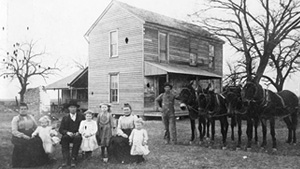From Proud Heritage, Vol. 1 by DCPA, not currently in print.
Effie Susan Ferguson was born the 16th of April 1875 near the banks of the Trinity River in a struggling little town of muddy streets called Dallas.
Her parents, James Parson and Susan Morrow Ferguson, had come to Texas from “Ole” Missouri some fifteen years before her birth. For an account of the family’s history prior to 1875 we rely on an undated newspaper clipping written by Effie’s eldest brother, Billy, who had made the trip to Texas with his parents.
James P. and Susan Ferguson, his brother, David J. and wife, who was a Pummill, and their young children, left their home near Chamois in northeast Missouri for Dallas, Texas. This was in 1860 and the trip by covered wagon took them through Arkansas and Indian Territory.
William S. Ferguson, “Uncle Billy”, was only six years old, but he recalled the family was in Arkansas on Election Day and the men were drinking and wild with excitement and the general opinion was that if Abe Lincoln were elected, there would be a war and his father would have to go.
The wagon road through Indian Territory took them to Boggy Depot where Billy’s younger brother fell ill and died. This was near present Atoka, Oklahoma. The loss of his brother and the sight of the strange people called Indians made an indelible impression on the boy.
The family, which had left Missouri to escape the harsh winters, now found itself in Dallas County in late November in the midst of a snowstorm. They settled first on the George West farm in the Cochran Chapel community. The Cochran Chapel Methodist Church, near the site of the old community, is now at the corner of Northwest Highway and Midway Road on Bachman Creek. It is some distance from what was then Dallas on the Trinity River.
Apparently, James P. and Susan did not immediately buy land on which to farm in Dallas, as no deed record is in evidence. He did find work at Terry’s Grist Mill, which was on a creek off the Trinity and near the end of present Commerce Street Viaduct.
Dallas had been almost completely destroyed by fire in July 1860, and in July 1861 the rebuilding of the town was underway. There was a demand for teamsters, and James P. hauled bricks from Michel’s Brickyard near Mill Creek to help in the rebuilding.
In the meantime the family moved to a house then at the intersection of Cochran and Lamar Streets, now obliterated by a freeway. Effie S. Ferguson is believed to have been born at this location some years later.
When the Civil War began, James P. and his brother, David J., enlisted in the 30th Texas Cavalry. Susan took the children and “moved to the country.” They lived on Jack Cole’s place near present Cole Park.
As the War progressed, food and supplies were hard to come by. There was plenty of game, but no men to hunt it nor guns with which to shoot it. The women and children were able to grow some of their food, and fish were plentiful. The Confederate Troops, who had helped with supplies originally, were unable to keep their commitments, so the people were on their own.
In 1864, the family managed to grow a crop of sorghum. Billy, who was ten at the time, and a little Negro boy attempted to make sorghum molasses with the old sorghum mill. Billy caught his hand in the cogs and his hand was badly mangled. Army surgeons and a local doctor named Sanders amputated his arm at the wrist.
After the surrender in 1865, James P. returned to find his family in very dire circumstances. He was able to secure employment with Judge J. M. Patterson, who had built a large grist, flour and sawmill on White Rock Creek. There was also a distillery in connection with the mill.
The mill received no money for grinding, but took part of the grain in compensation. Then the grain was ground into flour and sold to freighters who operated between Dallas, Shreveport, Jefferson and Houston. It is said that two-wheeled oxcarts came from as far as Mexico to dispose of their grain.
James P. Ferguson worked for Judge Patterson for twelve years and then leased the mill himself, operating it with the help of his sons Billy and Milton.
Grandmother Effie Ferguson was born during this time in April, 1875. Brother Billy had married and had a daughter about the age of Effie. The two girls were playmates; and though they had been often warned to stay away from the millhouse, the girls found it an exciting place to play. One day as the girls were playing, Billy’s daughter caught her apron in the mill wheel and was pulled into the wheel crushing her to death. Effie vividly remembered the tragedy when she was in her eighties.
It must have been a short time later that James P. gave up the mill and moved to Tarrant County to farm. His son, William S., remained in Dallas and became active in local politics. Another son, Robert E. Lee Ferguson, was a farmer in the Lawson community for a number of years. Effie Ferguson grew to womanhood in Tarrant County, but moved back to Lawson and Dallas in later years after her marriage to Charles Houston Williams.
Effie and C. H. Williams reared the following children in Dallas and Tarrant County: 1) Bessie Williams born 11 December 1894. 2) Doyle Wylie Williams born 26 January 1896. 3) Alice Irene Williams born 2 August 1899. 4) Mae Laverne Williams born 23 April 1903. 5) Myra Williams born 1 February 1905. 6) Joe Weldon Williams born 14 April 1908. 7 & 8, twins) Lillie Mae and Willie Lee born 28 January 1911. 9) Mary Lee Williams born 14 July 1912.
By Mrs. Rayburn H. Williams, Dallas


